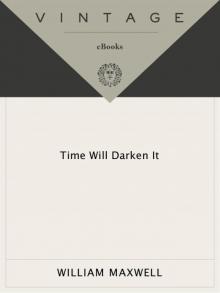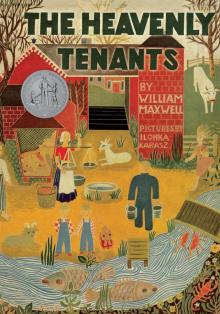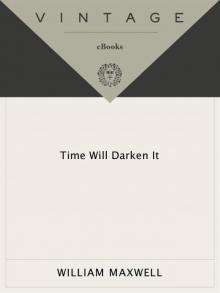- Home
- William Maxwell
The Chateau Page 2
The Chateau Read online
Page 2
The train began to move. Cherbourg was left behind.
The coach was not divided into compartments but open, like an American railway car. Looking out of the train window, they saw that the sky was now overcast. They saw hedgerows enclosing triangular meadows and orchards that were continually at a slant and spinning with the speed of the train. House after house had been shelled, had no windows or roof, had been abandoned; and then suddenly a village seemed to be intact. They saw poppies growing wild on the railroad embankment and could hardly believe their eyes. That wonderful intense color! They were so glad they had seen them. They saw a few more. Then they saw red poppies growing all through a field of wheat—or was it rye? They saw (as if seeing were an art and the end that everything is working toward) a barn with a sign painted on it: Rasurel.
Their eyes met, searching for some relief from looking so intently at the outside world. “We’re in France,” he said, and let his hand rest lightly in hers. The train came to a stop. They looked for the name on the station: Valognes. They saw flower beds along the station platform. Blue pansies. “Pensées,” it said in the pocket dictionary. They saw a big blond man with blue eyes and bright pink cheeks. They saw a nice motherly woman. They saw a building with a sign on it: Café de la Gare. The station was new. In a moment this tiny world-in-itself was left behind. He looked at his watch.
“What time do we change?” she asked, smothering a yawn.
“At two. It’s now seventeen minutes of one.”
“We’d better not fall asleep.”
He felt his right side and was reassured; his wallet and their passports were in his inside coat pocket, making a considerable bulge. “Is it the way you remembered it?” he asked anxiously. “I know there weren’t any ruined buildings, but otherwise?”
“Yes. Except that we were in a car.”
That other time, she was with her father and mother and two brothers. They went to England first. They saw Anne Hathaway’s cottage, and Arlington Row in Bibury, and Oxford, and Tintern Abbey. And because she was sick in bed with a cold, they left her alone in the hotel in London while they went sight-seeing, and she had a wonderful afternoon. The chambermaid brought her hot lemonade with whisky in it, and it was the first time she had ever had any whisky, and the chambermaid took a liking for her and gave her a gold locket, which she still had, at home in her blue leather jewel case.
After England, they crossed the Channel and spent two weeks in Paris, and then they drove to Concarneau, which they loved. In her snapshot album there was a picture of them all, walking along a battlement at Carcassonne. That was in 1933. The hem of her skirt came halfway to her ankles, and she was twelve years old.
“What is Cinzano?” she asked.
“An apéritif. Or else it’s an automobile.”
… five, six, seven. Knowing that nothing had been left behind, he nevertheless could not keep from insanely counting the luggage. He looked out of the train window and saw roads (leading where?) and fields. He saw more poppies, more orchards, a church steeple in the distance, a big white house. Could it be a château?
The yawn was contagious, as usual.
“Where do you suppose the Boultons are now?”
“Southampton,” he said. “Or they might even be home. They didn’t have far to go.”
“It was funny our not speaking until the last day—”
“The last afternoon.”
“And then discovering that we liked them so much. If only we’d discovered them sooner.” Another yawn.
“I have their address, if we should go to England.”
“But we’re not.”
She yawned again and again, helplessly.
They no longer had to look at each hedgerow, orchard, field, burning poppy, stone house, barn, steeple. The landscape, like any landscape seen from a train window, was repetitious. Just when he thought he had it all by heart, he saw one of Van Gogh’s little bridges.
Her chin sank and sank. He drew her over against him and put her head on his shoulder, without waking her. His eyes met the blue eyes of the priest across the aisle. The priest smiled. He asked the priest, in French, to tell him when they got to Carentan, and the priest promised to. Miles inland, with his eyes closed, he saw the gulls gliding and smelled salt water.
His eyelids felt gritty. He roused himself and then dozed off again, not daring to fall sound asleep because they had to change trains. He tried willing himself to stay awake, and when that didn’t work, he tried various experiments, such as opening his eyes and shutting them for a few seconds and then opening them again immediately. The conductor came through the car examining tickets, and promised to tell him when the train got to Carentan. Though the conductor seemed to understand his French, how can you be sure, speaking in a foreign language, that people really have understood you?… The conductor did come to tell them, when the train was slowing down, on the outskirts of Carentan, but by that time the luggage was in a pile blocking the front of the coach, and they were standing beside it, ready to alight.
What should have been a station platform was, instead, a long, long rock pile. Looking up and down it as the train drew to a stop he saw that one of his fears, at least, was justified: there were no porters. He jumped down and she handed him the lighter suitcases, but the two big ones she could not even lift. The other passengers tried to get by her, and then turned and went toward the other end of the coach—all except a red-headed man, who saw that they were in trouble and without saying a word took over, just as Harold was about to climb back on the train.
What a nice, kind, human face …
All around them, people were stepping from rock to rock, or leaping, and it was less like changing trains than like a catastrophe of some kind—like a shipwreck. The red-haired man swung the dufflebag down expertly and then jumped down from the train himself and hurried off before they could thank him. Until that moment it had not occurred to Harold to wonder how much time they would have between trains.
He stopped a man with a light straw suitcase. “Le train à Coutances?”
“Voie D!” the man shouted over his shoulder, and when they didn’t understand, he pointed to the entrance to an underpass, far down the rock pile. “De ce côté-là.”
“Oh my God!”
“Why aren’t there any porters?” she asked, looking around. “There were porters in Cherbourg.”
“I don’t know!” he said, exasperated at her for being logical when they were faced with a crisis and action was what was called for. “We’ll have to do it in stages.” He picked up the big brown suitcase, and then, to balance it, two smaller ones. “You stay here and watch the rest of the luggage until I get back.”
“Who is going to watch those?” she demanded, pointing at the suitcases he had just picked up. “What if somebody takes them while you are coming back for more?”
“We’ll just have to hope they don’t.”
“I’m coming with you.” She picked up two more suitcases.
“No, don’t!” he exclaimed, furious at not being allowed to manage the crisis in his own way. “They’re too heavy for you!”
“So are those too heavy for you.”
Leaving the big white suitcase and the dufflebag (two thousand cigarettes, safety matches, soap, sanitary napkins, Kleenex, razor blades, cold cream, cleaning fluid, lighter fluid, shoe polish, tea bags, penicillin, powdered coffee, cube sugar, etc.—a four months’ supply of all the things they had been told they couldn’t get in Europe so soon after the war) behind and unguarded, they stumbled along in the wake of the other passengers, some of whom were now running, and reached the underpass at last, and went down into it and then up another long flight of steps onto Track D, where their train was waiting.
“How can they expect people to do this?” she exclaimed indignantly.
Track D was an ordinary station platform, not another rock pile, and all up and down the train the doors of compartments were slamming shut. “It’s like a bad dream,” he said.
He left her standing with the luggage beside a second-class carriage and ran back down into the underpass, his footsteps echoing against the cold concrete walls. When he emerged onto Track A again, the train from Cherbourg was gone. Far down the deserted rock pile he saw the big white suitcase and the dufflebag; they hadn’t been stolen. From that moment it was not merely France he loved.
He swung the dufflebag onto his shoulder and picked up the suitcase. It weighed a ton. The traveling iron, he thought. And Christ knows what else … His heart was pounding, and he had a stitch in his side. As he staggered up the steps of the underpass out onto Track D again, he saw that she was the only person left on the platform, beside the last open compartment door.
“Hurry!” she called. (As if he weren’t!)
He thought surely the train would start without them, not realizing that it was full of ardent excitable people who would have thrown themselves in front of the engine if it had. They leaned out of all the windows all up and down the train, shouting encouragement to the American tourists, shouting to the conductor and the brakeman that Monsieur was here, finally, but still had to get the luggage on.
When the luggage had been stowed away in the overhead racks, they sat trembling and exhausted and knee to knee with six people who did not speak a word of English but whom they could not under the circumstances regard as strangers. A well-dressed woman with a little boy smiled at them over the child’s head, and they loved her. They loved her little boy, too. Looking out of the train window, they saw the same triangular meadows and orchards as before, the same tall hedgerows, and poppies without number growing in the wheat.
“It was very nice of that man to hand the suitcases down to you,” she said.
“Wasn’t it.”
“I don’t know what we’d have done without him.”
“I don’t either.”
“What an experience.”
Conscious that by speaking English to each other they were separating themselves from the other people in the compartment, and not wanting to be separated from them, they lapsed into silence. He made himself stop counting the luggage. After a time, the man directly across from them—a farmer or a laborer, judging by his clothes and his big, misshapen, callused hands—took down a small cardboard suitcase. They saw that it contained a change of underwear, a clean shirt, a clean pair of socks, a loaf of bread, a sausage, and a bottle of red wine that had already been uncorked. The sausage was offered politely around the compartment and politely refused. With dignity the man began to eat his lunch.
“What time is it?” Barbara asked.
Harold showed her his watch. If only there were porters in the station in Coutances … He looked searchingly at the other faces in the compartment. He was in love with them all.
There were no porters in the railway station at Coutances, and the crisis had to be gone through all over again, but nothing is ever as bad the second time. The station platform was not torn up, and he did not wait for somebody to see that they were in difficulty; instead, he turned and asked for help and got it. As he shook hands with one person after another, looking into their intelligent French eyes and thanking them with all his heart, he began to feel as if an unlimited amount of kindness had been deposited somewhere to his account and he had only to draw on it. Coupled with this daring idea was an even more dangerous one: he was becoming convinced by what had happened to them that in France things are different, and people more the way one would like them to be.
At Pontorson he saw a baggage truck and helped himself to it, thinking that this time he had surely gone too far and an indignant station agent would come running out and make a scene. No one paid any attention to him. The bus parked in front of the station said Le Mont-Saint-Michel over the windshield but it was empty, and they discovered from a timetable posted on the wall nearby that it did not leave for an hour and a half. He looked at her drawn, white face and then walked out into the middle of the station plaza in search of a taxi. The square was deserted. For a moment he did not know what to do. Then he saw a bus approaching and hailed it. The bus came to a stop in front of him, and he saw the letters St. Servan–St. Malo and that there were no passengers.
“Nous cherchons un hôtel,” he said when the driver put his head close to the open window. “Nous avons beaucoup de baggages, et il n’y a pas de taxi.… Ma femme est malade,” he lied, out of desperation, and then corrected it in favor of the truth. “Elle est très fatiguée. Nous désirons—”
The door swung open invitingly and he hopped in. The big bus made a complete turn in the middle of the square and came to a stop in front of the pile of luggage. He jumped out and ran into the station and found Barbara, and they got in the bus, which went racing through the very narrow, curving streets, at what seemed like sixty miles an hour, and stopped in front of a small hotel. The driver refused to take any money, shook hands, and drove on.
Harold took the precaution of looking the hotel up in the Guide Michelin. “Simple mais assez confortable,” it said. He stuffed the Michelin back in his raincoat pocket.
The hotel was old and dark and it smelled of roasting coffee beans. The concierge led them up a flight of stairs and around a corner, to a room with windows looking out on the street. The room was vast. So was the double bed. So was the adjoining bathroom. There was no difficulty about hot water. The concierge took their passports and went off down the hall.
“Whenever I close my eyes I see houses without any roofs,” he said.
“So do I.”
“And church steeples.” He loosened his tie and sat down to take off his shoes. “And Cinzano signs.”
The automatic images fell on top of one another, as though they were being dealt like playing cards.
“There’s something queer about this bed,” she said. “Feel it.”
“I don’t have to. I can see from here. I don’t think we’ll have any trouble sleeping, though.”
“No.”
“The way I feel, I could sleep hanging from a hook.”
While she was undressing, he went into the bathroom and turned on both faucets. Above the sound of the plunging water, he heard her saying something to him from the adjoining room. What she said was, she was glad they hadn’t gone on to Mont-Saint-Michel.
“I am too,” he called back. “I don’t think I could bear it. If I saw something beautiful right now, I’d burst into tears. The only thing in the world that appeals to me is a hot bath.”
The waitress was at the foot of the stairs when they came down, an hour later. “Vous désirez un apéritif, monsieur-dame?”
She hadn’t the slightest objection to their sitting at one of the tables outdoors, in front of the hotel, and before they settled down, he raced back upstairs and got the camera and took Barbara’s picture. He managed to get in also the furled blue and white striped umbrella, the portable green fence with geraniums and salvia growing in flower boxes along the top and bottom, and the blue morning-glories climbing on strings beside the hotel door.
“Quel apéritif?” demanded the waitress, when the camera had been put away. Finding that they didn’t know, because they had had no experience in the matter, she took it upon herself to begin their education. She returned with two glasses and six bottles on a big painted tin tray, and let them try one apéritif after another, and, when they had made their decision, urged them to have the seven-course dinner rather than the five; the seven-course dinner began with écrevisses.
“Ecrevisses” turned out to be tiny crawfish, fried, with tartar sauce. There were only two other guests in the dining room, a man and a woman who spoke in such low tones and were so absorbed in each other that it was quite clear to anyone who had ever seen a French movie that they were lovers.
As the waitress changed their plates for the fourth time, Barbara said: “Wonderful food!” The color had come back into her face.
“Wonderful wine,” Harold said, and asked the waitress what it was that they were drinking. The wine was Algerian and h
ad no name, so he couldn’t write it down in his little notebook.
When they went up to their room, the images started coming once more. Their eyelids ached. They felt strung on wires.
The street outside their window was as quiet as a cemetery. They undressed and sank sighing into the enormous bed, so like a mother to them in their need of rest.
AFTER TEN O’CLOCK there was no sound in the little hotel, and no traffic in the street. The night trucks passed by a different route.
At midnight it rained. Between three and four in the morning, the sky cleared and there were stars. The wind was off the sea. The air was fresh. A night bird sang.
The sleepers knew nothing whatever about any of this. One minute they were dropping off to sleep and the next they heard shouting and opened their eyes to broad daylight. When they sat up in bed they saw that the street was full of people, walking or riding bicycles. The women all wore shapeless long black cotton dresses. An old woman went by, leading her cow. Chickens and geese. Goats. The shops were all open. A man with a vegetable cart was shouting that his string beans were tender and his melons ripe.
“It’s like being in the front row at the theater,” she said. “How do you feel?”
“Wonderful.”
“So do I. Do you think if I pressed this button anything would happen?”
“You mean like breakfast?”
She nodded.
“Try it,” he said with a yawn.
Five minutes later there was a knock at the door and the waitress came in with a breakfast tray. “Bonjour, monsieur-dame.”
“Bonjour, mademoiselle,” he said. “Avez-vous bien dormi?”
“Oui, merci. Très bien. Et vous?”
“Moi aussi.”
“Little goat, bleat. Little table, appear,” Harold said as the door closed after her. “Have some coffee.”
After breakfast, they got up and dressed. She packed while he was downstairs paying the bill. The concierge called a taxi for them.
“I hate to leave that little hotel,” she said, looking back through the rear window as they drove off.

 The Chateau
The Chateau Time Will Darken It Time Will Darken It
Time Will Darken It Time Will Darken It The Heavenly Tenants
The Heavenly Tenants They Came Like Swallows
They Came Like Swallows So Long, See You Tomorrow
So Long, See You Tomorrow The Folded Leaf
The Folded Leaf All the Days and Nights
All the Days and Nights Time Will Darken It
Time Will Darken It Ancestors
Ancestors